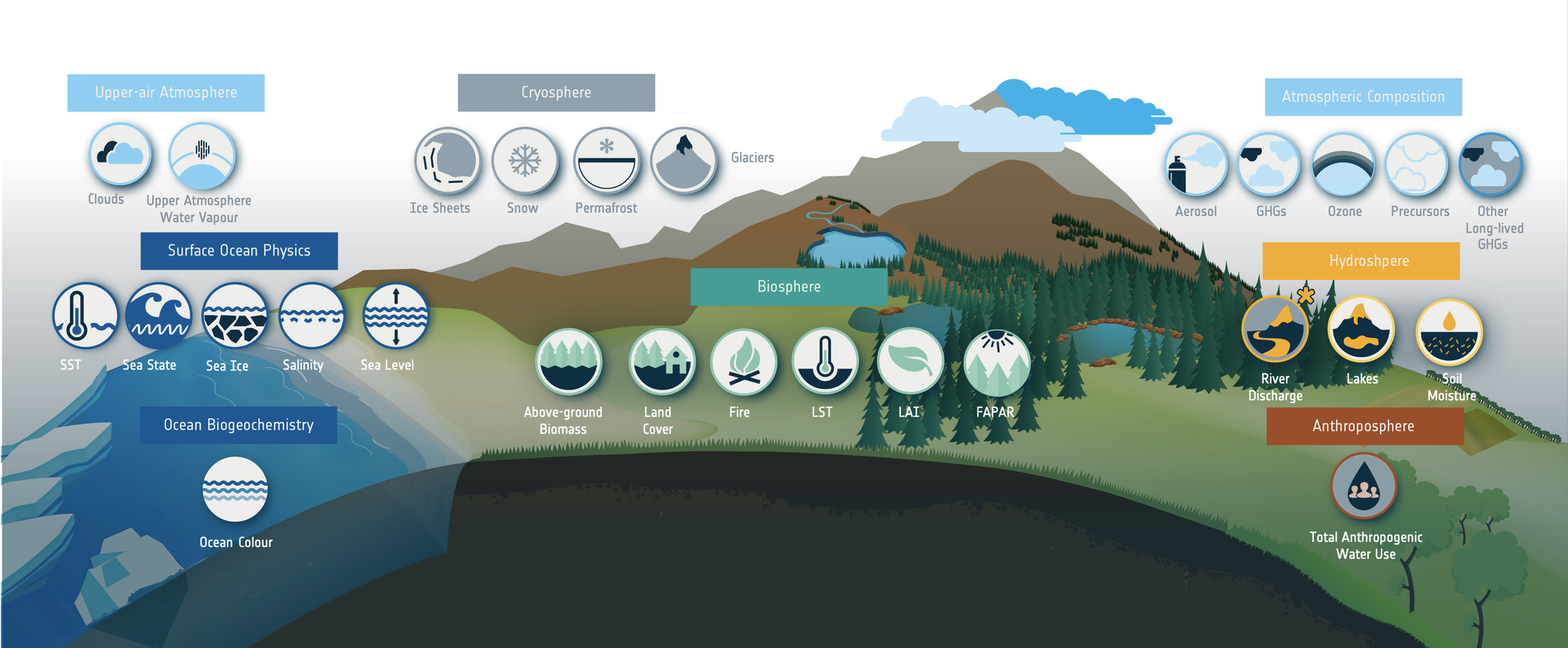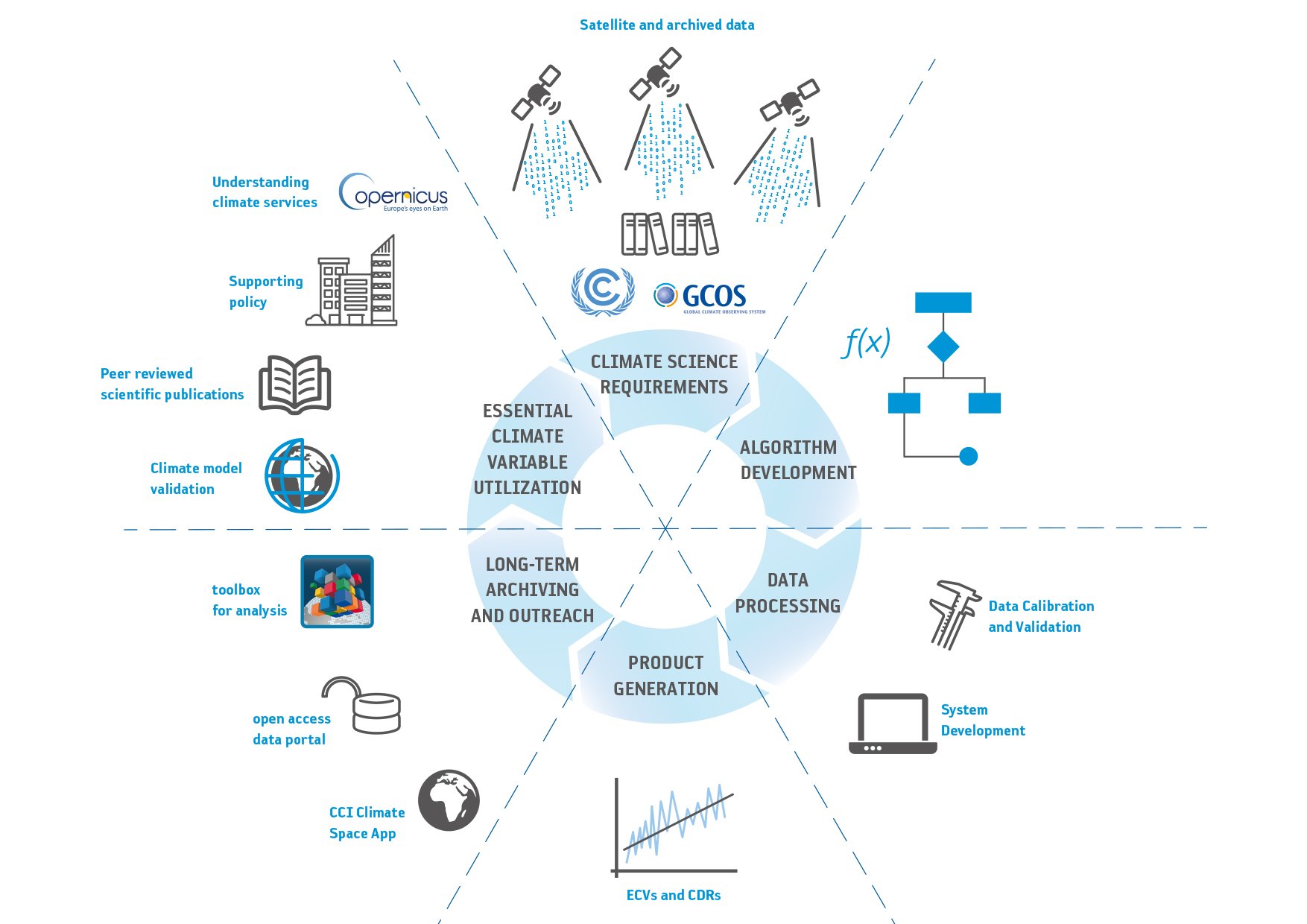Developing Essential Climate Variables
ESA's Climate Change Initiative develops satellite-derived data records to address several Essential Climate Variables
The European Space Agency’s Climate Change Initiative provides a major contribution to observation records required by the UNFCCC to understand, anticipate and address climate change.
The programme is currently addressing three-quarters of the Essential Climate Variables (ECV) (27 of 38) defined by Global Climate Observing System that are measurable from space.
These climate data records are available to users via the ESA climate data portal.

Climate Change Initiative data product development
The Programme comprises 27 parallel research projects, each dedicated to developing satellite-derived climate data products and processing systems that address GCOS-defined Essential Climate Variables.
Each project comprises teams of Earth observation experts, climate scientists, data engineers drawn from ESA Member States which undertake the following R&D activities:
Climate science user requirement collation
A first action is to collate, review and update user requirements of climate science and climate services for each ECV products to be developed.
This process takes into account the priorities of international climate assessments (e.g. IPCC AR6 WG1), and specific user requests for ECV data products, such as for use in e.g. model inter-comparison exercises, climate services, or model down-scaling. The analyses also take into account the latest GCOS status and implementation plan as well as updates to the WGClimate ECV Inventory.

Retrieval algorithm development
Several cycles of algorithm development and improvement are required to generate the required high quality multi-mission ECV data products needed by the end users. Algorithm development ensures data from the array of existing, and new, sensors can be incorporated consistently and support extension of the data record and development of sustainable system of production.
Large-scale Earth observation data processing
To produce data sets long enough for climate research (>30 years), the combination and inter-calibration of many different satellite missions is required and requires data from different missions and sensors to be merged and inter-calibrated in to one continuous series of data. Observations from ESA’s 40- year archive, together with currently operating ESA satellites, Copernicus Sentinels and ESA third-party missions all contribute to making up these data series.
Uncertainty characterisation, validation, product inter-comparison and assessment
Climate data records include rigorous uncertainty information, to support application of the data in policy, climate modelling and numerical weather prediction reanalysis. CCI ECV products, are generated with an emphasis on traceability and consistency both within and across projects, include quantitative estimates of uncertainty. Data products are fully validated against in-situ measurements and have been evaluated/inter-compared by leading members of the climate research community.
To support and ensure ECV data product consistency, quality and suitability is maintained from a user perspective, independent quality assessments across the various ECV products are undertaken by the CCI's Climate Modelling User Group (CMUG).
Long-term archiving and Knowledge Exchange
Once mature, CCI data products are made available to users with free and open access via the ESA climate data portal. To increase use and exploitation of these pre-operational datasets the CCI teams
- Peer-reviewed publications contribute to advancing climate science through the via peer-reviewed publication production.
- Model validation is supported through the provision of a growing selection of CCI data products that have been technically formatted and organised according to CMIP model output requirements and made available via the obs4MIPS project to facilitate use of satellite observations by the climate model analysis community.
- Transfer to operational climate service providers - an explicit goal of the programme is to transfer these pre-operational ECV data products and processing systems to climate service providers to support operational decision-making, thereby ensuring on-going exploitation and temporal extension by European citizens.
ECV development 2023-2029
The current phase of Climate Change Initiative will perform the necessary research and development to extend and expand the Programme's existing Essential Climate Variable portfolio. These activities will exploit data from new satellite missions and address the evolving requirements from GCOS and IPCC and operational climate services. Increasingly, R&D will generate and use ECV data products to support the developing road map towards support the UNFCCC Paris Agreement reporting and need for systematic forcing data sets for CMIP-7.
Access CCI ECV data and projects
ECV satellite-derived data products developed via the Climate Change Initiative are available via the ESA climate data portal.

